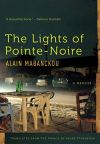
 Alain Mabanckou was born in the Republic of the Congo — not the Democratic Republic of the Congo, the other one, sometimes referred to as Congo-Brazzaville. In his early 20s, he left to study in Paris. Later he moved to the teach in the United States. Then, after more than two decades away, he returned to his hometown, Pointe-Noire, for a visit. In his memoir of the visit — The Lights of Pointe-Noire (translated into English by Helen Stevenson), he artfully alternates between stories from his past and his experience of re-encountering family members, friends, mentors, and others. I’ve read many memoirs of growing up in Africa, some of them very good, but Mabanckou offers a lyricism that is mesmerizing and exceptional. I could have spent much longer with him on this visit.
Alain Mabanckou was born in the Republic of the Congo — not the Democratic Republic of the Congo, the other one, sometimes referred to as Congo-Brazzaville. In his early 20s, he left to study in Paris. Later he moved to the teach in the United States. Then, after more than two decades away, he returned to his hometown, Pointe-Noire, for a visit. In his memoir of the visit — The Lights of Pointe-Noire (translated into English by Helen Stevenson), he artfully alternates between stories from his past and his experience of re-encountering family members, friends, mentors, and others. I’ve read many memoirs of growing up in Africa, some of them very good, but Mabanckou offers a lyricism that is mesmerizing and exceptional. I could have spent much longer with him on this visit.My previous experience with Mabanckou has been mixed: I liked Black Moses moderately well and I couldn’t get through African Psycho. Some reviewers mention that characters in this book appear earlier in Tomorrow I’ll Be Twenty. In this book, Mabanckou’s old high school philosophy teacher tells him that Memoirs of a Porcupine is his favorite of Mabanckou’s novels. After reading The Lights of Pointe-Noire, I’ll try some more of his work.
Here are a few passages that stood out to me. Only the last is in the author’s voice. The others are him recounting what others say to him over the course of his visit.
-
On shoes: “You know, Uncle, if you don’t have new sandals, you can’t get to school on time, you have to spend two hours in the street mending them and when you tell the teacher he won’t listen, he just says ‘little liar’, but it’s not true, I’m not a liar!”
-
On writing: “I don’t have that tapeworm in my gut that writers have, that eats away at their insides every day.”
-
On fertility in wartime: “Between you and me, babies still get born even when there’s oil and war in a country. The worst of it was, people went on making love even when people were falling like flies in the war. I expect you’ll be wondering: why didn’t they wait for the end of the war, to make love? Oh no, if you waited for the end of the war, people would forget how to make love, by the time the whole dirty war ended we’d be making love with animals!”
-
On American English: “We told the Americans they could do what they liked with our oil, we weren’t going to learn their weird English, where you talk through your nose, like you’ve got flu.”
-
On self-publishing: “I also packed the self-published books which had been given me by various local authors. I promised myself I would read them in Europe or America. There is always something enriching in the suffering of a creator who hopes his bottle thrown into the sea will one day reach its destination.”
The Complete Review has links to many other reviews of this book as well as choice excerpts. Here’s an excerpt from Suzi Feay’s review in the Financial Times: “The account is not linear but organic and spiralling, as Mabanckou ranges over his past according to whatever stimulus confronts him…. Sparklingly translated, this compact and artful memoir illustrates the universality of the maxim: you really can’t go home again.”
This is book #45 in my effort to read a book by an author from every African country in 2019. You can read reviews of all the books here.